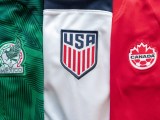Despite being an afterthought for many, the UEFA Nations League can have a significant impact on the European qualification process for the FIFA World Cup. Fans across the continent, including users of this website, should pay closer attention to how it unfolds.
Promotion, relegation and lifting the trophy are not the only things at stake in the final round of Nations League games. These matches also have potential implications for 2026 World Cup qualifying.
England, Scotland, Wales and Northern Ireland all have something to play for in the Nations League itself and it ties into the next World Cup.
Four teams will qualify for a play-off to reach the World Cup via their performances in the Nations League. These are identified as the four best-ranked group winners who do not finish in their respective top two positions in their upcoming year's World Cup qualifying group. Teams from Leagues B and C stand to gain extra incentive due to this arrangement.
As far as the home nations go, If England tops Group B2 or Wales tops B4 they would likely secure a spot in a World Cup playoff. Northern Ireland currently lead C3 which could provide them with an opportunity.
However, Scotland is currently out of contention for securing a playoff spot through this route, something it had previously done for other major competitions.
The four teams that make it into playoffs via the Nations League will join twelve other teams who finish second place within their respective World Cup qualifying groups - making four spots available for grabs for the 2026 World Cup.
In 2026 there will be an expanded number of European nations participating, as 16 total countries head out from Europe to the tournament hosted by the United States, Canada and Mexico.
This means that there will be changes made to how qualifications work compared to previous tournaments.
There will be twelve groups containing either four or five teams each drawn on 13th December. The top two teams from each group in League A will be placed into a World Cup qualifying group containing four teams. Teams participating in Nations League promotion-relegation playoffs in March will not start World Cup qualifying until June, or possibly September.
Seedings for the World Cup qualifying groups are primarily decided by FIFA world rankings rather than Nations League finishes. However, the top seeds will be drawn from the teams who finish in the top two of each League A group - plus the four highest-ranked countries globally.
England's current ranking makes them highly likely to be among these top seeds despite not being part of League A.
All home nations have something at stake with only two games remaining.
Scotland are at risk of relegation from League A as they sit three points behind, going into their final games against Croatia and Poland.
England need to beat Greece for a chance at automatic promotion from League B. Otherwise, they face a promotion-relegation playoff with a third-placed team from League A.
Wales could win automatic promotion to League A if they beat Turkey and Iceland but also face potential relegation-promotion playoffs.
Northern Ireland are currently primed to secure automatic promotion from League C. They can secure this position if they win their final two matches against Belarus and Luxembourg.
While the Nations League isn't always considered the most glamourous competition by fans, its impact on World Cup qualification remains significant. It provides an additional route towards securing spots within World Cup tournaments while adding extra layers of competition amongst European nations.












